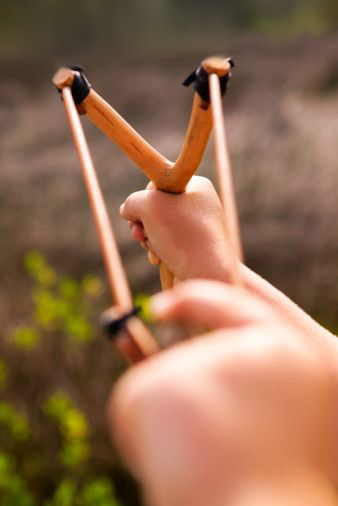 “How David Beats Goliath” is a fascinating New Yorker magazine article by Malcolm Gladwell, the author of The New York Times non-fiction best sellers “The Tipping Point,” “Blink,” and “Outliers.”
“How David Beats Goliath” is a fascinating New Yorker magazine article by Malcolm Gladwell, the author of The New York Times non-fiction best sellers “The Tipping Point,” “Blink,” and “Outliers.”
Turns out, at least according to Gladwell, that being the underdog, David to Goliath, can be an advantage. But only as long as you play by David’s rules and not Goliath’s. In essence, underdogs have won as long as they “acknowledged their weakness and chose an unconventional strategy.”
Gladwell cites the work of political scientist Ivan Arreguin-Toft, who analyzed every war fought over the last 200 years between strong and weak opponents, where one side was at least 10 times as powerful in terms of armed might and population. In spite of such an overwhelming advantage, Goliaths lost an amazing 28.5% of the time. AND, if the weaker side chose an unconventional strategy (breaking the normal rhythm of the encounter, such as slowing it down, speeding it up, or somehow chopping it up), Goliaths lost 63.6% of the time.
How could this be? How could underdogs create the conditions where they so frequently were victorious? Gladwell speaks of the Insurgents Creed:
1. Insurgents work harder, much harder. They are relentless, untiring, unceasing. They know they are underdogs and they know they are on the edge. Only extraordinary effort will carry the day, even the odds.
2. Insurgents are willing to do what is “socially horrifying.” They challenge convention, they disdain the establishment, they break the rules. But who made the rules they break? Goliath! And why does Goliath make the rules that he does? Because when the world has to play on Goliath’s terms, Goliath wins. The “price” insurgents pay for their independence is, of course, being ostracized. “The price the outsider pays for being so heedless of custom is, of course, the disapproval of the insider.” I am sure that the British redcoats thought the American rebels fought in a most unfair manner.
Gladwell states that “substituting effort for ability turns out to be a winning formula for underdogs in all walks of life…. We tell ourselves that skill is the precious resource and effort is the commodity. It’s the other way around. Effort can trump ability…because relentless effort is in fact something rarer than…ability.” He deftly uses basketball, war games, and Lawrence of Arabia to illustrate his points.
What’s compelling about all this, the inspirational point, is that while our ability may be somewhat inherently in our genes, the effort we put forth is entirely up to us.

